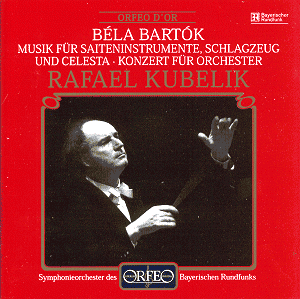 |
Béla BARTÓK (1881-1945) Crotchet
AmazonUK
AmazonUS |
Tumultuous applause breaks out at the end of both of these compelling performances of two of Bartók's most popular orchestral works; proof, if it was ever needed, of the strength and lucidity of Kubelik's conducting. A Czech, Rafael Kubelik was also a violinist and composer as well as a conductor. He had strong ties with Hungary; his mother had been a Hungarian countess. He met Béla Bartók when the latter was performing as a pianist and the attraction to Bartók's music naturally developed. As you can hear from these thrilling but lucid readings, not only does Kubelik respond superbly to the intensity and high voltage excitement of Bartók's music, but he entirely respects the composer's insistence on clarity and precision.
Under Kubelik, the virtuoso sections of the Bavarian Radio Symphony Orchestra never put a foot wrong in this magnificent reading of Bartók's Concerto for Orchestra (composed in 1943 in the U.S.A.). The outer movements are biting, strongly propelled and full of tension, with revelatory nuance and detail; the quirky glissandi, the abrupt changes of rhythm, tempi and mood splendidly realised. The inner Intermezzi bristle with wit, irony and sarcasm - just listen to how bitingly sarcastic Kubelik makes the famous take-off of the tune from The Merry Widow! The central Elegia is disturbing and enigmatic. From the opening unfolding of the music, like a flower in a wood dappled by afternoon sunshine, Kubelik throws out huge thunderbolts and takes us into a world of dark heart-rending tragedy. A thought-provoking performance that carries the listener far beyond just an appreciation of a virtuosos showpiece for orchestra.
The Music for Strings, Percussion and Celeste is equally compelling - the opening speaking of isolation and disorientation and near anguish with Kubelik's strings winding tension up to an almost unbearable degree. The scherzo second movement flashes past brilliantly with Kubelik emphasising the hard syncopated rhythms that determine the music's whirling course. But it is the slow movement that impresses the most with Kubelik showing us an almost chilling contrast between the magical soft dreamlike luminescence suffused with the voices of nature, and the dread nightmarish material with Bartók darkly sardonic. The finale is more joyful and high spirited yet with a hint of desperation. Kubelik's rendition is highly infectious and has great rhythmical energy.
Splendid performances that could hardly be bettered. The readings are emotionally powerful, exciting and revelatory. Highly recommended.
Ian Lace